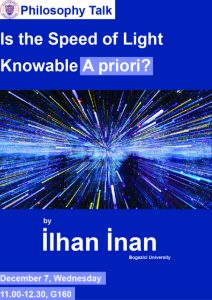İlhan İnan (Boğaziçi University)
 “Is the Speed of Light Knowable A priori?”
“Is the Speed of Light Knowable A priori?”
Date: Wednesday 7 December, 2016
Time: 1100-1230
Place: G160
Abstract: Given the current “definition” of the concept of meter a simple argument appears to show that some scientists could come to know the answer to the question “how many meters does light travel in a vacuum in one second?” without having to do any observations or calculations. It would then seem that their knowledge of the speed of light would have some unusual epistemic properties such as being certain, infallible and indubitable, and perhaps also analytic. What is more shocking is that we may also be able to conclude that these scientists know the speed of light a priori. This appears to be a new version of the puzzle about how long the “standard meter bar” is, which Wittgenstein discusses in his Philosophical Investigations, later taken up by Saul Kripke in Naming and Necessity yielding the puzzling conclusion that certain contingent truths are knowable a priori. In this talk I discuss how the new version of the puzzle differs from the old one, why Nathan Salmon’s and Keith Donnellan’s “solutions” to the old puzzle are really not solutions, how the current literature on mental files can be employed to approach the puzzle. I then argue the notion of apriority employed in the argument requires further elaboration so that we may conclude, following Nenad Miscevic, that “interesting a priori knowledge cannot be gotten for cheap.”
